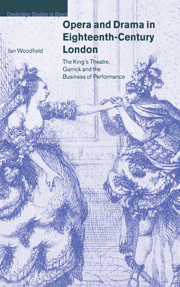 Opera and Drama in Eighteenth-Century London
Opera and Drama in Eighteenth-Century London Book contents
- Frontmatter
- Contents
- List of tables
- List of musical examples
- Acknowledgements
- A note on conventions
- Introduction
- 1 The Hobart management
- 2 The new managers take control
- 3 Sacchini and the revival of opera seria
- 4 Recruitment procedures and artistic policy
- 5 The King's Theatre in crisis
- 6 The recruitment of Lovattini
- 7 The English community in Rome
- 8 Lucrezia Agujari at the Pantheon
- 9 Caterina Gabrielli
- 10 Rauzzini's last season
- 11 The King's Theatre flourishes
- 12 The Queen of Quavers satire
- 13 Financial management
- 14 Opera salaries
- 15 The sale of 1778
- Appendices
- Notes
- Bibliography
- Index
2 - The new managers take control
Published online by Cambridge University Press: 22 September 2009
- Frontmatter
- Contents
- List of tables
- List of musical examples
- Acknowledgements
- A note on conventions
- Introduction
- 1 The Hobart management
- 2 The new managers take control
- 3 Sacchini and the revival of opera seria
- 4 Recruitment procedures and artistic policy
- 5 The King's Theatre in crisis
- 6 The recruitment of Lovattini
- 7 The English community in Rome
- 8 Lucrezia Agujari at the Pantheon
- 9 Caterina Gabrielli
- 10 Rauzzini's last season
- 11 The King's Theatre flourishes
- 12 The Queen of Quavers satire
- 13 Financial management
- 14 Opera salaries
- 15 The sale of 1778
- Appendices
- Notes
- Bibliography
- Index
Summary
Any change of management in the King's Theatre was a matter of considerable interest to the aristocratic opera-going classes, and when early in 1773 news began to circulate that Hobart had finally given up, rumours about the succession were rife. On 12 January, George Bussy Villiers reported that the opera house was now to be ‘undertaken by several Gentlemen’. Changes were being made, and ‘some new Boxes’ were ‘already added to the theatre’. The leading figure in the financial take-over was James Brooke, who purchased from Hobart a half share of the company and then a further one-third share, giving him overall control. The remaining one-sixth share was retained by Peter Crawford, who continued to work as treasurer. Brooke was acting on behalf of his brother, the Reverend John Brooke and his wife Frances Brooke, and Richard and Mary Ann Yates. John Brooke seems to have had no active involvement in the King's Theatre at all. When the new managers took out a modest mortgage with the banker Henry Hoare, he was named as one of the three parties to the agreement who were: (1) James Brooke; (2) Richard and Mary Ann Yates; (3) John and Frances Brooke. The mortgage, however, was for the ‘joint and equal benefit’ of the other four. James Brooke, acting on behalf of his brother's wife, is often described as one of the proprietors.
- Type
- Chapter
- Information
- Opera and Drama in Eighteenth-Century LondonThe King's Theatre, Garrick and the Business of Performance, pp. 29 - 39Publisher: Cambridge University PressPrint publication year: 2001
